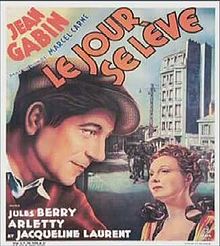- Le Jour Se Lève
-
Le Jour se lève 
Film posterDirected by Marcel Carné Written by Jacques Prévert
Jacques ViotStarring Jean Gabin
Jules Berry
ArlettyMusic by Maurice Jaubert Cinematography Philippe Agostini
André Bac
Albert Viguier
Curt CourantEditing by René Le Hénaff Distributed by AFE Release date(s) June 9, 1939 Running time 93 min. Country France Language French Le Jour se lève (or Daybreak) is a 1939 French film directed by Marcel Carné and written by Jacques Prévert, based on a story by Jacques Viot. It is considered one of the principal examples of the French film movement known as poetic realism.
The film was remade as The Long Night (1947), with Henry Fonda in the Gabin role. In 1952, it was included in the first Sight and Sound top ten greatest films list.
Contents
Synopsis
The film begins with foundry worker François (Jean Gabin) shooting and killing Valentin (Jules Berry). François then locks himself in his room in a guest house at the top of many flights of stairs. He is soon besieged by the police, who fail in an attempt to shoot themselves into the room, as François barricades himself in.
In a series of flashbacks punctuated by glimpses of the present, it is revealed that François had become involved with both the naive young floral shop worker Françoise (Jacqueline Laurent), and the more experienced Clara (Arletty), who until she met François had been the assistant in Valentin's performing dog act. It becomes clear that the manipulative Valentin, an older man, had himself been involved with both women, and he becomes jealous of François (at one point, mendaciously telling François that he, Valentin, was Françoise's father, although both she and François had grown up in orphanages). Finally Valentin confronts François in his room, bringing with him the gun with which François eventually shoots him.
As we return to the present, François continues to chain-smoke nervously in his room. Françoise, having learned of his plight, has become delirious and is being tended to by Clara in her room at a nearby hotel. Then, two policemen climb over the roof of François's building, preparing to throw tear gas grenades through the window of François's room. Before they can do so, François, consumed with despair, shoots himself in the heart. The film ends with tear gas clouds filling the room around his lifeless body.
Cast
- Jean Gabin as François
- Jacqueline Laurent as Françoise
- Jules Berry as M. Valentin
- Arletty as Clara
- Arthur Devère as Mr. Gerbois
- Bernard Blier as Gaston
- Marcel Pérès as Paulo
- Germaine Lix as La chanteuse
- Georges Douking as blind man
Distribution
Le Jour se lève was released in France in June 1939, and it was shown in the USA in the following year. In France in 1940 however, it was banned by the Vichy government on the grounds that it was demoralizing and had contributed to the nation's defeat.[1] After the end of the war, the film was shown again to wide acclaim.
In 1947, it was again suppressed when RKO Radio Pictures wanted to remake the film in Hollywood (as The Long Night). The company acquired the distribution rights of the French film and sought to buy up and destroy every copy of the film that they could obtain. For a time it was feared that that they had been successful and that the film was lost, but it re-appeared in the 1950s and has subsequently stood alongside Les Enfants du paradis as one of the finest achievements of the partnership of Carné and Prévert.[2]
References
- ^ Le jour se lève by Philip Kemp at encyclopedia.com
- ^ "Le Jour se lève", in Nicholas Thomas (ed) International Dictionary of Films and Filmmaking: 1: Films, 1990, Chicago & London: St James Press, p.447; "Le Jour se lève", in Liz-Anne Bawden (ed) The Oxford Companion to Film, 1976, Oxford: Oxford University Press, p.373.
See also
External links
Films directed by Marcel Carné Nogent, Eldorado du dimanche · Jenny · Bizarre, Bizarre · Port of Shadows · Hôtel du Nord · Le Jour Se Lève · Les Visiteurs du Soir · Children of Paradise · Gates of the Night · La fleur de l'âge · La Marie du port · Juliette, or Key of Dreams · Thérèse Raquin · Air of Paris · The Country I Come From · The Cheaters · Wasteland · Chicken Feed for Little Birds · Three Rooms in Manhattan · Young Wolves · Law Breakers · The Marvelous Visit · The BibleBFI Sight & Sound Poll 1952 1962 1972 Citizen Kane • The Rules of the Game • Battleship Potemkin • 8½ • L'Avventura • Persona • The Passion of Joan of Arc • The General • The Magnificent Ambersons • Ugetsu • Wild Strawberries
1982 Citizen Kane • The Rules of the Game • Seven Samurai • Singin' in the Rain • 8½ • Battleship Potemkin • L'Avventura • The Magnificent Ambersons • Vertigo • The General • The Searchers
1992 Critics'Citizen Kane • The Rules of the Game • Tokyo Story • Vertigo • The Searchers • L'Atalante • The Passion of Joan of Arc • Pather Panchali • Battleship Potemkin • 2001: A Space Odyssey
Directors'2002 Critics'Citizen Kane • Vertigo • The Rules of the Game • The Godfather & The Godfather Part II • Tokyo Story • 2001: A Space Odyssey • Battleship Potemkin • Sunrise: A Song of Two Humans • 8½ • Singin' in the Rain
Directors'Categories:- 1939 films
- French films
- 1930s drama films
- Crime drama films
- Romantic drama films
- Black-and-white films
- Films directed by Marcel Carné
- 1930s French film stubs
Wikimedia Foundation. 2010.
